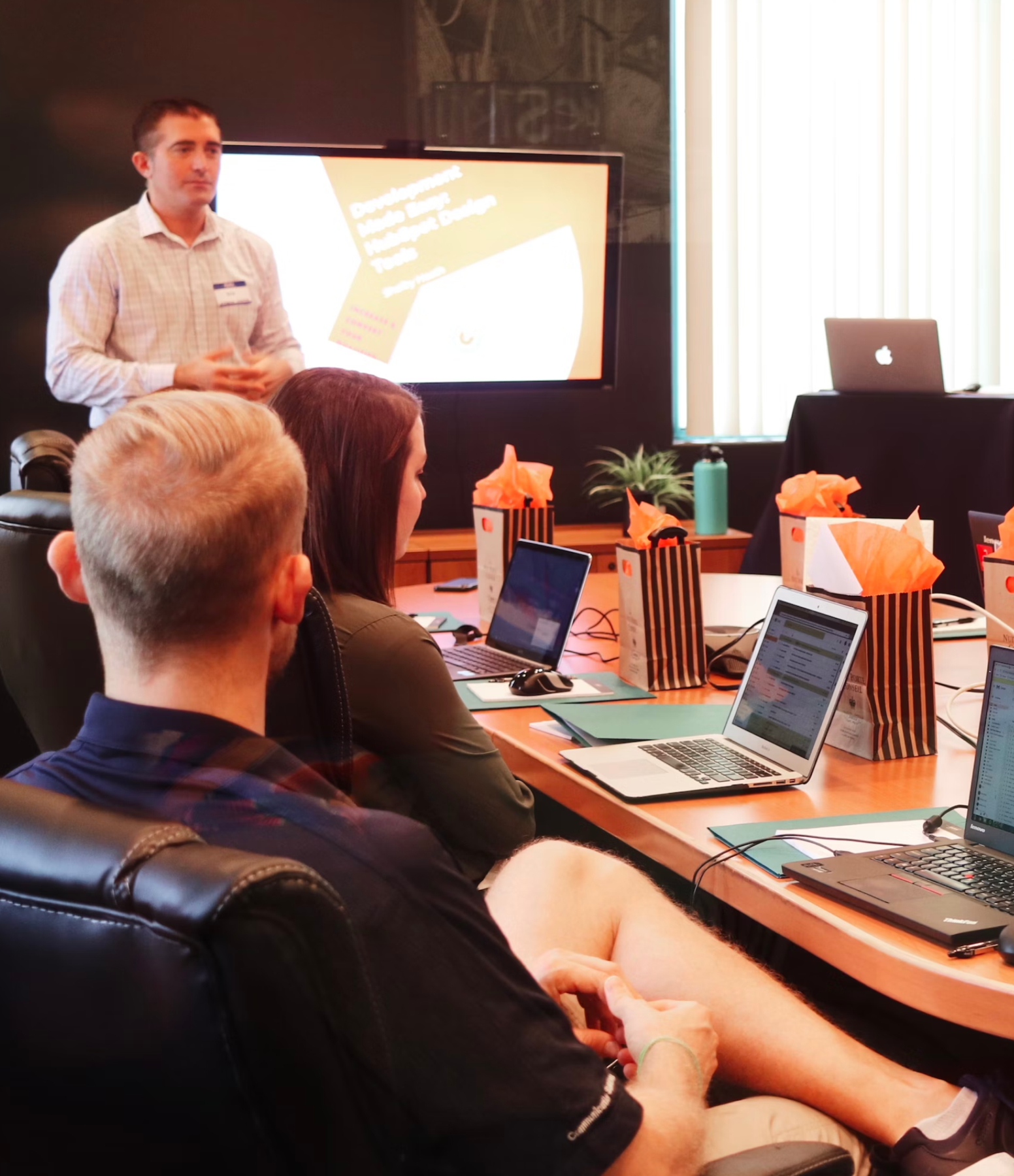PMI Agile Certified Practitioner (PMI-ACP)® - eLearning
450,00 EUR
This PMI-ACP® (Agile Certified Practitioner) training will empower you to become a skilled agile professional with knowledge of various agile methodologies, including Scrum, Kanban, Lean, extreme programming, and test-driven development. This course is aligned with recent updates to the PMI-ACP exam, using the Agile Practice Guide as new reference material. This course covers agile methodologies, tools, techniques, and the concepts of the Agile Practice Guide while providing real-life scenarios.
Course timeline

Course Introduction
Lesson 01
- Course Introduction
- Eligibility Requirements
- Certification Fees and Renewal
- About our Course
Agile Principles and Mindset - Part 1
Lesson 02
- Agile principles and mindset - part 1
- Introduction to Agile
- Agile engineering Practices
- The Agile Manifesto
- Applying the Principles of the Agile Manifesto
- Agile Core Principles and Practices
- Benefits of Agile
- Project Life Cycle Characteristics
- Key Takeaways
- Knowledge Check
Agile Principles and Mindset - Part 2
Lesson 03
- Agile Principles and Mindset - Part Two
- Agile Methodologies
- Agile Mindset
- Where to Apply Agile
- Meaning of Scrum
- Features of Scrum
- Three Pillars of Scrum
- Scrum Roles
- Key Terms of Scrum
- Scrum Meetings
- Scrum: An Empirical Process
- Extreme Programming
- Extreme Programming Practices - Part A
- Extreme Programming Practices - Part B
- Roles in Extreme Programming
- Process Diagram of XP
- Crystal Method
- Properties of Crystal Method
- Key Categories of Crystal Method - Part A
- Key Categories of Crystal Method - Part B
- Dynamic Systems Development Method (DSDM)
- Basic Principles of Atern
- Planning Philosophy in DSDM
- DSDM Techniques
- DSDM Phases
- Feature-Driven Development
- Agile Project Management
- Key Takeaways
- Knowledge Check
Value-Driven Delivery - Part 1
Lesson 04
- Value-Driven Delivery - Part One
- Quantifying Customer Value
- Time Value of Money
- Time Value of Money: Example
- The Financial Feasibility of Projects
- Return on Investment ROI
- Net Present Value (NPV)
- Net Present Value (NPV): Example
- Internal Rate of Return (IRR)
- Payback Period
- Payback Period: Example
- Prioritization of Functional Requirements
- Moscow
- Kano Model
- Relative Weighting
- Prioritization of Non-Functional Requirements
- Risk Management in Agile
- Key Takeaways
- Knowledge Check
Value-Delivery Delivery - Part 2
Lesson 05
- Value-Driven Delivery - Part 2
- Minimal Viable Product
- Project Planning Using MVP
- Agile Compliance
- Key Drivers of Agile Compliance
- Incremental Delivery
- Review and Feedback
- Earned Value Management
- Earned Value Metrics
- Earned value Metrics: Example
- Agile Contracts: Components
- Agile Contracting Methods
- Fixed-Price or Fixed-Scope Contracts
- Time and Materials (T and M) Contracts
- T and M with fixed Scope and Cost selling
- T and M with variable Scope and Cost selling
- Bonus of Penalty Clauses
- Terms used in Agile Contracts
Stakeholder Engagement - Part 1
Lesson 06
- Stakeholder Engagement - Part One
- Stakeholder Engagement
- Project Charter
- Understanding Stakeholder Needs
- Agile Wireframes
- User Story
- Story Card Information
- Agile Personas
- Theme and Epic
- Agile Story Maps
- Community and Stakeholder Values
- Key Takeaways
- Knowledge Check
Stakeholder Engagement - Part 2
Lesson 07
- Stakeholder Engagement - Part 2
- Community Management
- Communication and knowledge sharing
- Social Media Communication
- Information Radiators
- Burnup and Burndown Charts
- Kanban or Task Board
- Impediment Logs
- Characteristics of Information Radiators
- Agile Modeling
- Active Listening
- Key Elements of Active Listening
- Globalization Diversity and Cultural Sensitivity
- Cultural Diversity Issues: Recommendations
- Agile Facilitation Methods
- Agile Negotiation and Conflict Management
- Five Levels of Conflict
- Key Takeaways
- Knowledge Check
Team Performance - Part 1
Lesson 08
- Team Performance - Part One
- Features and Composition of Agile Teams
- Stages of Agile Team Formation
- High-Performance Teams
- Generalizing Specialist
- Team Responsibility
- Self-Organization
- Key Takeaways
- Knowledge Check
Team Performance - Part 2
Lesson 09
- Team Performance - Part Two
- Agile Leadership
- Best Practices of Agile Leadership
- Management vs Leadership
- Servant Leadership
- Coaching and Mentoring
- Agile Coaching
- Agile Emotional Intelligence
- Team Motivation
- Maslow’s Theory
- Frederick Herzberg's Theory
- McClelland's Theory
- Boehm's Theory
- Team Space
- Co-Located Teams
- Distributed Teams
- Co-Located vs. Distributed Teams
- Osmotic Communication
- Team Collaboration and Coordination
- Collaboration Technology
- Communication Gap-Example One
- Communication Gap-Example Two
- Brainstorming Sessions
- Team Velocity
- Velocity-Example One
- Velocity-Example Two
- Sample Velocity Chart
- Velocity-Example Two
- Agile Tools
Adaptive Planning - Part 1
Lesson 10
- Adaptive Planning - Part One
- Planning Philosophy
- Aligning Agile Projects
- Rolling Wave Planning
- Timeboxing
- Best Practices of Timeboxing
- Advantages of Timeboxing
- Agile Estimation
- Story Points
- Assigning Story Points
- Story Points Estimation
- Story Points Estimation Scale: Example
- Value Points
- Ideal Days
- Story Points vs. Ideal Days
- Wideband Delphi Technique
- Planning Poker
- Planning Poker: Example
- Affinity Estimation
- Key Takeaways
- Knowledge Check
Adaptive Planning - Part 2
Lesson 11
- Adaptive Planning - Part Two
- Project Size Estimation
- Release Plan
- Release Plan: Example
- Iteration Plan
- Types of Iteration Planning
- Iteration Lifecycle: Example
- Release Plan vs. Iteration Plan
- Agile Product Roadmap
- Backlog Refinement - Part Two
- Value-Based Analysis and Decomposition
- Agile Cone of Uncertainty
- Velocity Variations
- Sprint Reviews
- Sprint Retrospectives
- Mid-Course Corrections
- Key Takeaways
Problem Detection and Resolution - Part 1
Lesson 12
- Problem Detection and Resolution - Part One
- Agile Problem Detection
- Problem Detection Techniques
- Fishbone Diagram
- Five Whys Technique
- Control Charts
- Lead Time and Cycle Time
- Kanban
- Kanban Process
- Example of Kanban Board
- Work In Progress
- Managing Constraints
- Little’s Law
- Escaped Defects
- Agile Problem Solving
- Key Takeaways
- Knowledge Check
Problem Detection and Resolution - Part 2
Lesson 13
- Adaptive Planning
- Metrics and Measures
- Benefits of Metrics
- Examples of Metrics
- Baseline Metrics
- Variance and Trend Analysis
- Risk Management Life Cycle
- Step One-Risk Identification
- Step Two-Risk Assessment
- Step Three-Risk Response Strategies
- Step Four-Risk Review
- Risk Log
- Risk Burndown Chart
- Risk Profile Graph
- Spike
- Agile Failure Modes
- Agile Coach Failure Modes
- Troubleshooting Guidelines
- Key Takeaways
- Knowledge Check
Continuous Improvement - Part 1
Lesson 14
- Continuous Improvement - Part One
- Kaizen
- Kaizen in Agile
- Lean
- Defining Waste Manufacturing and Software Development
- A Five-Step Process to Becoming Lean
- Value Stream Mapping
- Agile Retrospectives
- Cargo Smells
- Conducting a Retrospective
- Brainstorming Techniques
- Process Analysis Techniques
- Agile Process Tailoring
- Project Factors That Influence Tailoring
- Key Takeaways
- Knowledge Check
Continuous Improvement - Part 2
Lesson 15
- Continuous Improvement - Part Two
- Quality in Agile
- Best Practices for Quality in Agile
- Best Practice One: Verification and Validation
- Best Practice Two: Exploratory Testing
- Best Practice Three: Usability Testing
- Best Practice Four: Test-Driven Development
- Test-Driven Development Advantages
- Acceptance Test-Driven Development Cycle (ATDD)
- Best Practice Five: Continuous Integration
- Best Practice Six: Definition of Done
- Testing Pyramid and Quadrant
- Checklist for Story Completion
- Agile Flowchart
- Agile Spaghetti Diagram
- Organizational Self Assessment
- Key Takeaways
- Knowledge Check
E-commerce Website Functionality Creation
Project 01
Participants will learn how the three agile roles (Product Owner, Scrum Master, and Scrum Team) complement each other in a real-time project on Jira. This demo of an e-commerce website will help users understand and create backlogs, user stories, tasks, epics, and sub-tasks. It will also show you how to manage multiple releases.
Smart Weather
Project 02
You will complete two industry-based tasks provided by the product owner of a new technology division. The projects involve creating a portal to provide weather-based services to multiple clients. The portal needs to pull the weather forecast from various public services to use the captured datafor various purposes. Implementation of this project should be completed through JIRA.
BigBucks Cafe
Project 03
BigBucks Café, a leading chain of premium coffee shops, wants you to use weather data to regulate and manage its daily operations. As a Scrum Master, you need to resolve and create a prioritized product backlog for the scrum team.
LeViva
Project 04
The world’s largest life insurance company, LeViva, wants to launch an app to serve its customers, and they would like to use the weather forecast. As a Scrum Master, you need to resolve and create a prioritized product backlog for the scrum team.
Learning Outcomes
At the end of this (PMI-ACP) eLearning Course, you will be able to:
Understand the history of agile, including its founding, evolution, core concepts, and principles.
Develop a working knowledge of the agile principles of Scrum, Kanban, XP, and TDD
Develop the expertise in implementing multi-iterative development models for any scale of projects
Develop the ability to deliver high-velocity stories and epics
Develop the knowledge and skills required to clear the PMI-ACP certification exam along with the requisite 21 PDUs

Who Should Enroll in this Program?
Prerequisites:
- A secondary degree or higher degree.
- 2000 hours of general project management experience in the last five years.
- At least 1,500 hours of experience working on agile project teams during the last three years.
Project managers
Agile Team members
Associate/assistant project managers
Team leads/managers
Project executives/engineers
Software developers
Any professional aspiring to be a project manager
PMGI-ACP
Exam Application Process
- Register to become a member of the Project Management Institute (PMI)
- Take our PMI-ACP Exam Prep Course to satisfy the required 21 contact hours (PDUs) education requirement
- Submit your PMI-ACP application through the PMI website and pay the fee
- Schedule your exam with Pearson VUE
- Take and pass the PMI-ACP Exam
- Agile Principles and Mindset (16%)
- Value-driven Delivery (20%)
- Stakeholder Engagement (17%)
- Team Performance (16%)
- Adaptive Planning (12%)

Need corporate solutions or LMS integration?
Didn't find the course or program which would work for your business? Need LMS integration? Write us, we will solve everything!
